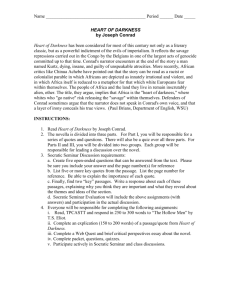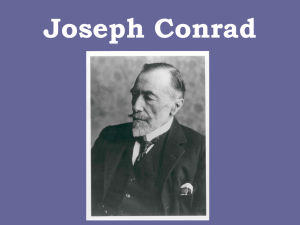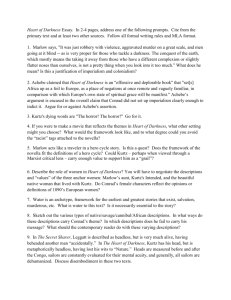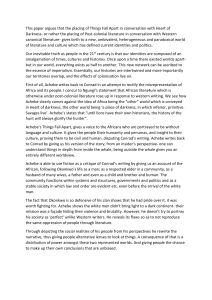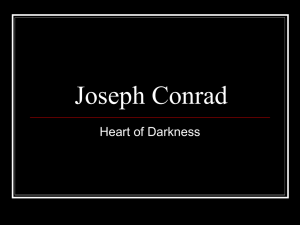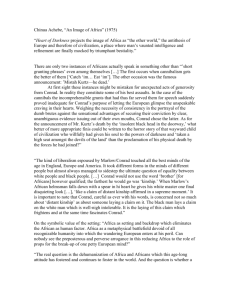*An Image of Arica: Racism in Conrad*s Heart of Darkness* Chinua
advertisement
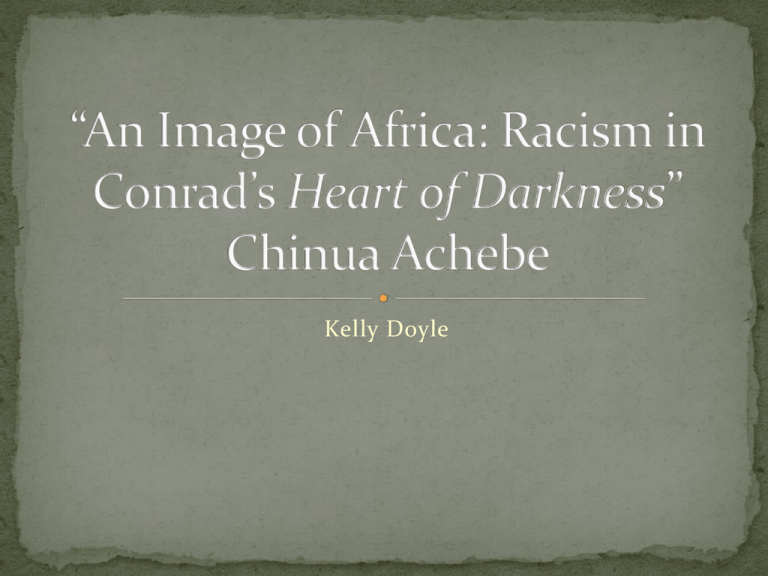
Kelly Doyle “Africa as setting and backdrop which eliminates the African as human factor. Africa as a metaphysical battlefield devoid of all recognizable humanity, into which the wandering European enters at his peril. Can nobody see the preposterous and perverse arrogance in thus reducing Africa to the role of props for the breakup of one petty European mind? But that is not even the point. The real question in the dehumanization of Africa and Africans which this age-long attitude has fostered and continues to foster in the world. And the question is whether a novel which celebrates this dehumanization, which depersonalizes a portion of the human race, can be called a great work of art. My answer is: No, it cannot” (343). https://www.youtube.com/watch?v=GzeYK6DzSWE Conrad’s overt racism in both Heart of Darkness and in his personal life How this racism is overlooked by scholars who proclaim that Heart of Darkness is “among the half-dozen greatest short novels in the English language” (337). We as a society should reevaluate the importance of Heart of Darkness, past and present. Heart of Darkness perpetuates a dangerous stereotype of Africa Frame (like in Heart of Darkness) Instances of Racism in Heart of Darkness Examples from Conrad’s personal life Why our collective view of Heart of Darkness needs to shift Differences in versions of the article 1977/1988 Title: “An Image of Africa” Kinship: “hint of kinship and common ancestry” (338) Conrad … is concerned not so much about distant kinship as about someone laying a claim on it (343) Humanity: “What thrilled you was just the thought of their humanity-like yours…Ugly” (339) “Place”: “He might not exactly admire savages clapping their hands and stamping their feet but they have at least the merit of being in their place” (340) Language: “it is clearly not Conrad’s purpose to confer language on the ‘rudimentary souls’ of Africa” (341). “The first is that it is no concern of fiction to please people about whom it is written” (346). 2. “Secondly, I may be challenged on the grounds of actuality. Conrad, after all, did sail down the Congo in 1890 when my own father was still a babe in arms. How could I stand up more than fifty years after his death and contradict him?” (346). 1. How can Achebe’s claims further our understanding of Heart of Darkness? Do we completely buy into his claims? Why or why not? What more is needed to take his claims into account? Should Heart of Darkness be taken out of the literary canon as Achebe suggests? If not, what are the merits of Heart of Darkness that Achebe may be overlooking? Heart of Darkness is influential for many reasons that are glossed over in Achebe’s article. Achebe asserts Conrad’s authorial intent. Does/would historical context explain some of Conrad’s views? RESPONSE HANDOUT
